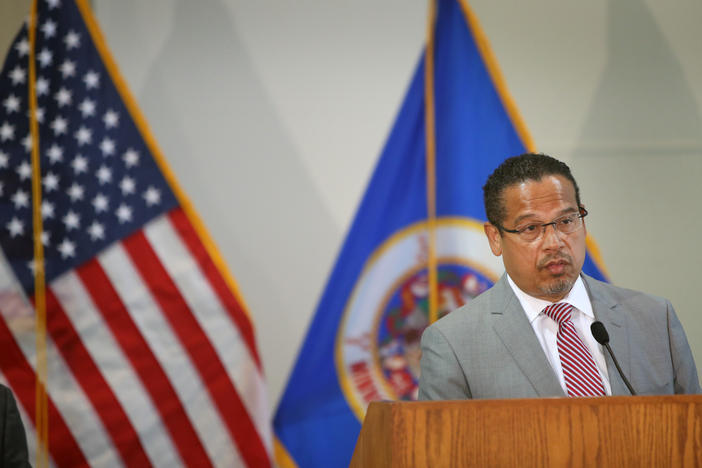Section Branding
Header Content
New book details how California prosecutors took down sex trafficking site Backpage
Primary Content
NPR's Rachel Martin talks to Maggy Krell, an ex-California state prosecutor, about her book, Taking Down Backpage: Fighting The World's Largest Sex Trafficker.
Transcript
RACHEL MARTIN, HOST:
Maggy Krell knew it wasn't going to be just another case. The former California state prosecutor was going after one of the largest sex trafficking websites in the world. It was called Backpage, and in large part because of Krell's effort, it's been shut down since 2018. She tells the story of that remarkable case in a new book called "Taking Down Backpage: Fighting The World's Largest Sex Trafficker." In a plea deal with prosecutors, the CEO admitted to conspiracy to facilitate prostitution and money laundering. He testified against the two men who founded the site with him. Late last year, a federal judge declared a mistrial in that case. A new trial is expected next month.
A warning - this conversation is not appropriate for all listeners.
Maggy Krell says she didn't go after Backpage because of consensual commercial sex; it was about selling children for sexual activity.
MAGGY KRELL: The youngest victim that was part of our case was 12 years old. We saw the majority of the victims were teenagers, kids that had run away from home, kids that were failed in various ways by the child welfare system. Some of them had already suffered sexual abuse in their own homes before being trafficked on the streets and through Backpage, victims who had been forced and coerced into being advertised on that site against their will.
MARTIN: So at one point, as you're putting this all together, the attorney general of California at the time, Kamala Harris, now the vice president, pushed you on why you thought you could bring convictions against these guys, the founders and owner, when so far they had evaded state or federal charges.
KRELL: Sure. I mean, definitely, you know, a big, high-profile case like that - could we prove this case beyond a reasonable doubt? Did we have a good-faith belief that we could convict these defendants? And that was something that needed to be explained to the attorney general's executive team and eventually to the attorney general herself. But she was very focused on combating human trafficking. This was a top priority for her. And she was excited about the prospect of being able to arrest the owners of Backpage.
MARTIN: But there were a lot of really big obstacles here, right? Explain what was so hard about this case.
KRELL: Well, it's really - it's the Communications Decency Act. The Communications Decency Act has been interpreted broadly to protect websites from liability based on content that's been posted by third-party users. This was passed in Congress in 1996, when the internet was really in its infancy. And the point was to allow for some moderation but also to protect the free exchange of ideas on the internet.
MARTIN: So how did this apply in your effort to bring sex trafficking charges against Backpage?
KRELL: Backpage had successfully invoked the Communications Decency Act immunity statute multiple times against civil cases. We wanted to make the point that a criminal case was different. Ultimately, we weren't able to attack from that angle. And our successful case was using money laundering charges. That was in 2018. I would say that today we have somewhat of a changing legal landscape. In 2018, the president signed the FOSTA-SESTA, Stop Enabling Sex Trafficking Act, which provides a specific provision that exempts sex trafficking charges from the Communications Decency Act's otherwise broad immunity.
So as we're seeing this shifting legal landscape and then also, you know, kind of a shift here in our cultural landscape with the #MeToo movement and high-profile and successful sex abuse prosecutions against, you know, Harvey Weinstein and R. Kelly and just recently the Nassar case, where decades of sexual abuse that had been swept up under the rug were uncovered - and so that's really helped shed a light, encouraged more people to come forward and, you know, helped us all be less tolerant.
MARTIN: I still don't understand how this site, the owners, how they were allowed to run this with basic - you know, with impunity. I mean, they sort of even trolled the federal government. When Carl Ferrer was arrested, the chief executive of Backpage, investigators found a certificate on his wall that said something like, you know, to honor you for all your cooperation and help with federal authorities. What's that about?
KRELL: That's right. You know, I was part of the team that went into his office, and I remember seeing that certificate. Backpage really did the bare minimum to kind of appease law enforcement. I mean, we had cases, sex trafficking cases for sure, where we would subpoena the ads from Backpage to get more information about, you know, where the victims were being posted and what the transactions were, and Backpage would cooperate, but they never did anything to prevent sex trafficking, and they did everything they could to continue to expand and benefit from it. And I - you know, I agree with what you're saying, that they certainly got away with this for too long. But, you know, for almost four years now, they have been shut down. And that CEO, Carl Ferrer, that you mentioned, you know, is a convicted felon - multiple felonies in multiple states.
MARTIN: You write in the book about the complicated dynamic between you as a state prosecutor and your team and federal authorities, the FBI, that the FBI was perhaps hesitant to go after the owners of Backpage because that site gave them a wide aperture into smaller criminal rings, right? And they didn't want that to go away.
KRELL: That's right. I understood that well. We certainly used Backpage as an information source for other sex trafficking cases. But it got to a point where Backpage, almost the - kind of the snitch on all of these other trafficking rings, was, you know, the largest criminal in the ring. Their multimillion-dollar handle was more than any other trafficker that I had prosecuted was making, and to me, we couldn't any longer turn a blind eye.
MARTIN: You're no longer in the prosecutor's office, right?
KRELL: Right.
MARTIN: How do you reflect back on that time, on that case, what you and your team were able to pull off against a lot of odds?
KRELL: This is a case that we are proud of. We know that this was a game-changer. This was a case that shifted the national narrative and certainly sent a message to survivors that this shouldn't be normalized, that their experiences matter. And that's incredibly significant. Clearly, there's a long road to justice, and there's more work to do. You know, there's other websites, and there's still no shortage of people who are being commercially sexually exploited. But this case was a huge step in the right direction.
MARTIN: Former prosecutor Maggy Krell. She is the author of the new book "Taking Down Backpage." Thanks so much for your time.
KRELL: Thank you, Rachel.
(SOUNDBITE OF FAIT'S "SURRENDER TO") Transcript provided by NPR, Copyright NPR.
Correction
An earlier web intro of this story incorrectly spelled the author's name. It is Maggy, not Maggie.
Bottom Content



